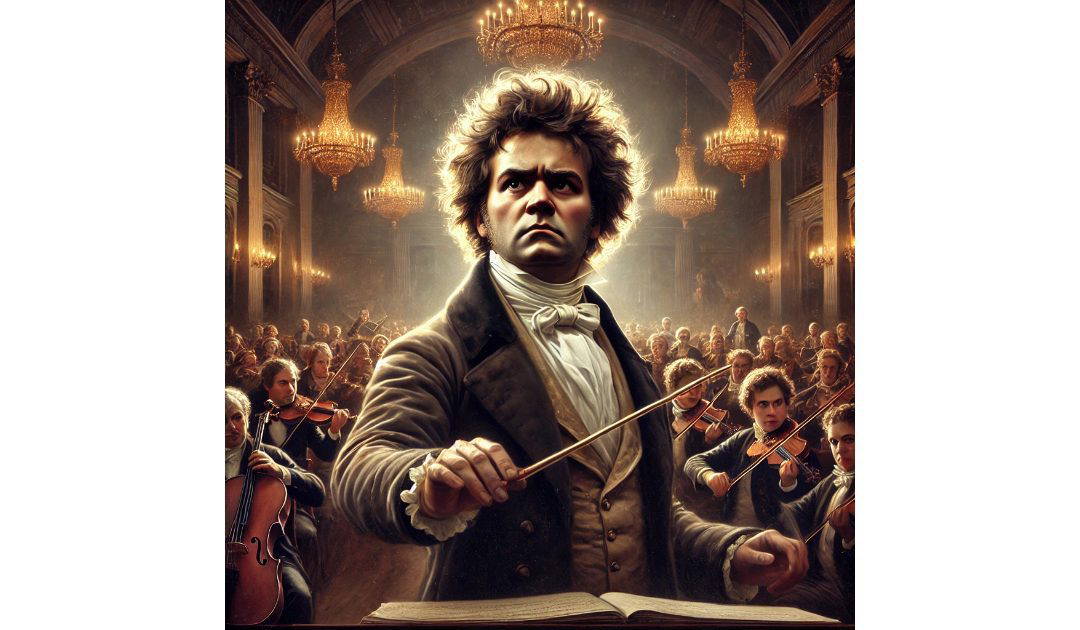Ludwig Van Beethoven led the premiere of his first symphony in Vienna, on the 2nd of April, 1800. Beethoven, a name that resonates through the annals of classical music history, remains one of the most influential and revered composers of all time. Born in Bonn, Germany, in December 1770, Beethoven’s life and work have inspired countless musicians and music lovers across the globe. His journey from a gifted child prodigy to a revolutionary composer encapsulates both triumph and tragedy, as his life was marked by profound personal challenges and extraordinary creative achievements.
Beethoven’s early exposure to music came from his family, particularly his father, Johann van Beethoven, who was a court musician. Recognizing his son’s exceptional talent, Johann became an ambitious and often harsh instructor, determined to shape Ludwig into a child prodigy akin to Mozart. By the age of 12, Beethoven had already published his first composition, showcasing his remarkable aptitude. His early education continued under the tutelage of notable musicians such as Christian Gottlob Neefe, who introduced him to the works of Bach and Mozart, profoundly influencing his musical development.
In his early twenties, Beethoven moved to Vienna, which was the musical capital of Europe. Here, he quickly established himself as a virtuoso pianist and began studying under Joseph Haydn. Vienna became Beethoven’s lifelong home, and it was here that he crafted the majority of his most celebrated works. His ability to improvise at the piano earned him considerable acclaim, and his compositions began to reflect a bold departure from the classical traditions of his predecessors, signalling the dawn of the Romantic era in music.
One of the defining aspects of Beethoven’s life was his struggle with hearing loss. In his late twenties, he began to experience tinnitus, which gradually led to complete deafness. This personal battle, which would have ended many musical careers, only served to deepen Beethoven’s resolve and fuel his creativity. Despite his affliction, he composed some of his most important works, including his Ninth Symphony and late string quartets, after losing his hearing. His determination and ability to compose music that he could not hear is a testament to his extraordinary genius and resilience.
Beethoven’s compositions are characterised by their emotional depth, innovative structures, and technical mastery. His symphonies, in particular, pushed the boundaries of orchestral music. The Third Symphony, known as the “Eroica,” was groundbreaking in its length and complexity, originally dedicated to Napoleon Bonaparte whom Beethoven admired before he saw him as a tyrant. The Fifth Symphony, with its iconic four-note motif, epitomises his ability to convey profound drama and intensity. The Ninth Symphony is perhaps his most ambitious work, notable for its choral finale, “Ode to Joy,” which embodies universal brotherhood and humanism.
In addition to his symphonies, Beethoven’s sonatas, string quartets, and concertos further solidified his legacy. The “Moonlight Sonata” remains one of the most beloved piano pieces, admired for its haunting beauty and emotional depth. His late string quartets, composed during his final years, explored harmonic innovations and complex structures that baffled his contemporaries and continue to inspire modern musicians.
Beethoven’s influence extends beyond the realm of classical music. His work has transcended time and culture, resonating with audiences and artists across various genres. His music has been adapted and referenced in films, literature, and popular culture, reflecting his enduring impact on the arts.
Throughout his life, Beethoven remained a solitary figure, often at odds with societal norms and personal relationships. His tumultuous life was marked by passionate love affairs, unfulfilled romances, and strained familial bonds. Yet, despite these personal challenges, his music remained a beacon of hope and an expression of the triumph of the human spirit over adversity.
In conclusion, Ludwig van Beethoven’s legacy is one of unparalleled innovation, emotional depth, and artistic brilliance. His music continues to inspire and captivate audiences around the world, reminding us of the power of creativity and the indomitable human spirit. As we listen to his compositions, we are reminded of the profound impact one individual’s vision can have on the world, transcending time and space, and leaving an indelible mark on the history of music. Of course if you want to know more, you really need to read Jon Suchet’s books. I was honoured to be interviewed by Jon at the Dartmouth Book Festival. Nobody knows more about Beethoven.

